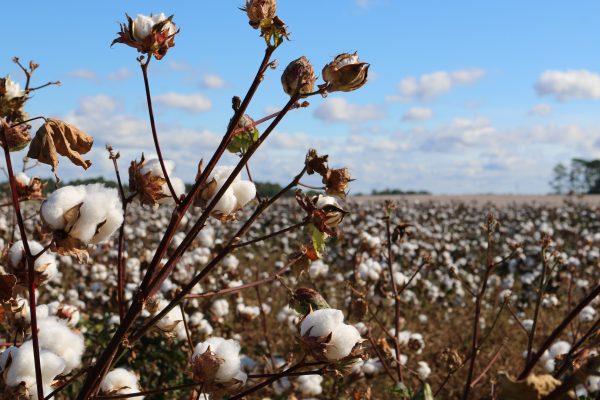Crossroads Asia | Economic system | Central Asia
Turkmenistan’s cotton business depends on pressured labor, however regardless of boycotts and bans items produced from Turkmen cotton proceed to achieve world markets.
In Central Asia, Uzbekistan has lengthy been criticized for state-managed pressured labor within the cotton business, however with enhancements in Uzbekistan Turkmenistan has come into sharper focus for continued use of pressured labor.
Earlier this yr, the Cotton Campaign called for the worldwide boycott of Uzbek cotton to be lifted following appreciable enhancements in addressing pressured labor. With greater than 300 manufacturers signed onto the pledge, there was nice sigh of reduction on the finish of the boycott and the opening of doorways for the Uzbek cotton business.
However Uzbekistan isn’t Central Asia’s solely cotton exporter. Neighboring Turkmenistan is also subject to a boycott coordinated by the Cotton Marketing campaign given pressured labor within the business, with 141 manufacturers and corporations at present signed on. In the case of cotton items basically, Uzbekistan exports way over Turkmenistan, however both countries are in the top 25 exporters of cotton. And though Turkmenistan’s cotton manufacturing pales compared to its oil and gasoline enterprise, the business stays an essential one within the nation.
In accordance to a report on the 2021 cotton harvest in Turkmenistan launched final month by Turkmen.information and the Turkmen Initiative for Human Rights (each members of the Cotton Marketing campaign), pressured labor of public sector workers was “widespread and systematic.” Screens additionally recorded circumstances of kid labor in Turkmenistan’s fields. The report covers how labor is pressured in Turkmenistan, situations within the cotton fields, the expertise of farmers, and likewise pressured labor within the manufacturing of silk.
The report additionally hones in on how Turkmen cotton enters the worldwide provide chain and the way it bypasses present bans to enter markets in america and Europe.
Broadly talking, Turkmen cotton enters world markets both immediately from Turkmenistan as completed or semi-finished items or by means of provides in third nations, corresponding to Turkey and China, but additionally Pakistan and Portugal, which import Turkmen cotton, yarn, and cloth and produce textiles and different cotton merchandise.
It’s this second stream that’s tougher to trace. In 2020, greater than 60 % of Turkmenistan’s uncooked cotton exports went to Turkey (which can also be among the many prime producers of cotton and cotton items on this planet). Turkey, in the meantime, is the European Union’s third-largest provider of textiles. In 2019, Anti-Slavery Worldwide launched a report that famous the prevalence of Turkmen cotton in Turkish merchandise. “The particular relationship between Turkey and Turkmenistan is of explicit relevance because it results in the next prevalence of Turkmen cotton and cotton merchandise in Turkey,” the report noted, occurring to level out the numerous variety of joint ventures between Turkish corporations and the state-controlled cotton business in Turkmenistan.
A variety of nations have laws in drive that prohibit the import of products produced by pressured labor. Most are comparatively broad, although mechanisms exist to enact particular bans.
In 2018, for instance, america banned the import of all cotton items from Turkmenistan by means of a “withhold release order” issued by U.S. Customs and Border Safety (CBP) given “affordable proof” of using pressured labor within the manufacturing or manufacturing of cotton items coming into the U.S. provide chain. Below the order, “All Turkmenistan Cotton or merchandise produced in complete or partially with Turkmenistan cotton” could be detained by CBP on the border “till/until importers can show the absence of pressured labor within the product’s provide chain.” The current report states: “All merchandise containing Turkmen cotton are tainted by pressured labor.”
In 2021, the Cotton Marketing campaign wrote letters to Overstock and Wayfair, two main on-line retailers, requesting that they take away sure gadgets containing Turkmen cotton. Neither firm has signed the Turkmen Cotton Pledge up to now, and a few cotton items (corresponding to towels) with Turkmenistan listed as the country of origin stay accessible to U.S. prospects. That is ostensibly in violation of the CBP “withhold launch order.”
There stay myriad avenues for the merchandise of pressured labor in Turkmenistan to make it into family items internationally: Turkmen yarn exported to China woven into sweaters and exported with “Made in China” on the tag; Turkmen cloth exported to Italy or Russia and sewn into drapes or attire. The current report from Turkmen.information and the Turkmen Initiative for Human Rights careworn that “The one manner manufacturers can guarantee their operations are freed from pressured labor is by mapping their provide chains all the way in which all the way down to the uncooked materials stage and excluding all cotton with Turkmen origins.”


